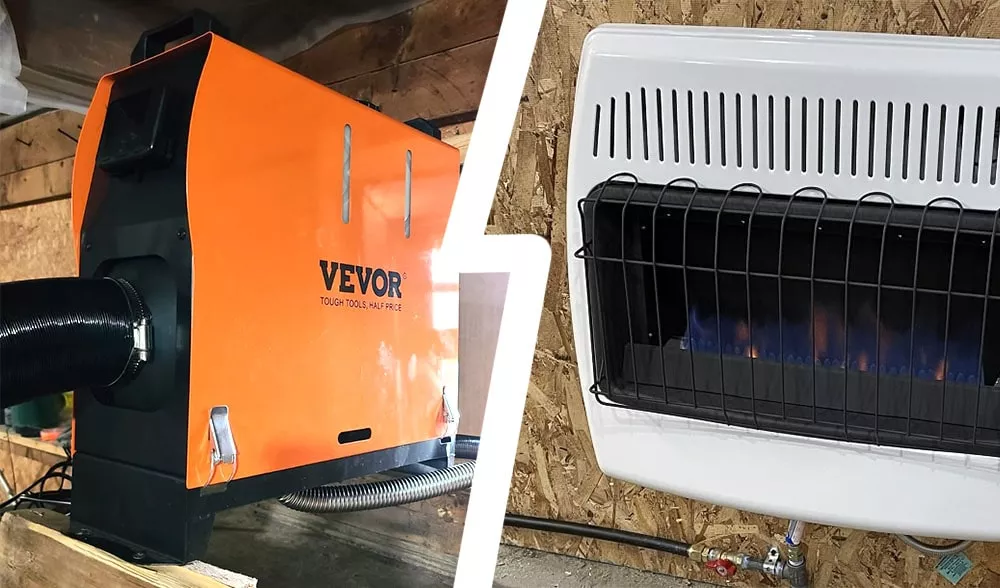Have a look at the vast amount of different diesel and propane heaters you can buy. It’s insane.
And if you’re someone who has never used either of them, you’re probably wondering what’s even different.
Of course, as their names suggest, diesel heaters use diesel, and propane heaters use propane. That’s obvious. But the technical implications following the fuel choice are significant.
In this article, we’re going to have a look at the differences between diesel and propane heaters and which of both, in my opinion, is the better heater.
Also, I’ll recommend you a good and trustworthy diesel heater and propane heater at the end of this article.
Quick answer: Propane heaters don’t need any electricity, no installation, and output lots of heat. They are great for off-grid heating, camping, garages and workshops. Diesel heaters are best wherever you have electricity and a constant supply of diesel, as in vans / cars / trucks.
Burn Rate: The Main Difference between Diesel and Propane as a Fuel
If you hold a burning match directly to diesel, nothing is going to happen. At least not for a minute. Diesel, in that sense, behaves similarly to cooking oil.
Hold the match to diesel for a minute or longer, and its temperature slowly rises until it slowly catches a flame.
If you throw a burning match into a large tank of diesel, it will extinguish.
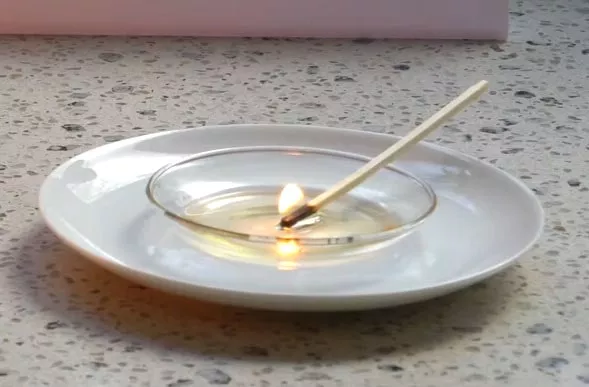 If you hold a match to a bowl of diesel, it won’t light!
If you hold a match to a bowl of diesel, it won’t light!
Diesel contains lots of energy but is very hard to light.
If you do the same and hold a burning match to a stream of propane gas exiting a tank, it instantly lights. And, if it were possible, you could throw the match into a pressurized tank containing liquid propane, it would explode instantly.
Diesel burns slowly, while propane combusts instantly.
If you understand this single difference, you’re way ahead of most people and you can derive most of the advantages and disadvantages of diesel vs propane heaters yourself.
5 Core Differences Between Diesel vs Propane Heaters
Let’s have a look at how diesel and propane heaters differ:
1. Electricity and Off-Grid Heating
Propane Heaters
Since propane burns so easily, propane heaters do not need electricity and work completely off-grid.
All it takes is a spark from a built-in igniter (similar to that of a lighter) to ignite a propane heater. In that sense, propane heaters work without electricity just like lighters work without electricity.
All propane heaters do is lead the gas coming from a propane tank to a ceramic heating element where the burning propane flame converts the combustion heat to infrared heat that radiates into the room.
There are some large-scale propane heaters, such as the Mr. Heater Big Maxx models, which do need some electricity. In an emergency, however, you can manually light them.
But all portable propane heaters, such as the Mr. Heater Buddy, work completely off-grid.
If you need an off-grid / emergency heater, get a propane heater.
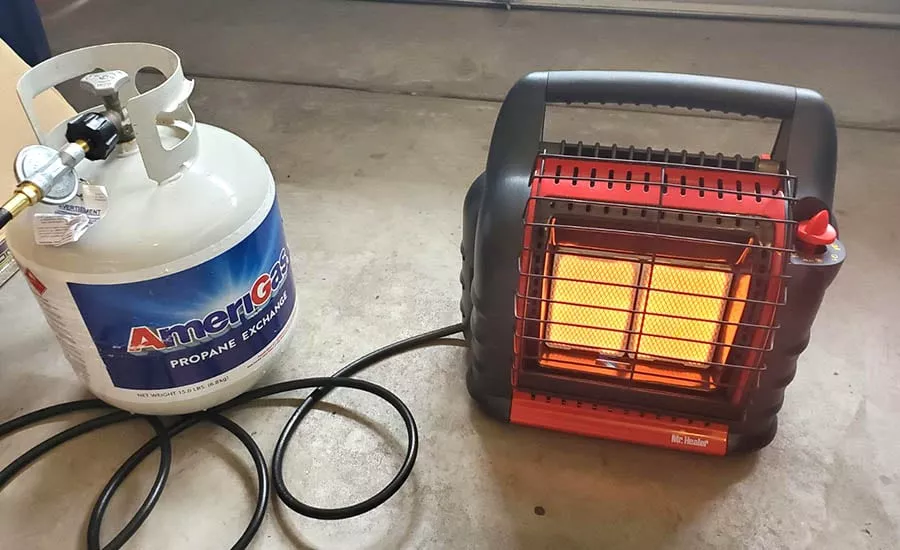 Propane heaters need only a propane tank to work, nothing else.
Propane heaters need only a propane tank to work, nothing else.
Diesel Heaters
Because diesel is so “hard” to combust, diesel heaters work completely differently than propane heaters do.
First of all, the diesel in the diesel tank does not flow into the heater on its own. To move the diesel to the combustion chamber, diesel heaters need a fuel pump.
Then, to ignite the diesel, you need some mechanism to disperse the diesel, which makes it easier to light. Then, you need a glow plug that lights it.
Additionally, diesel heaters need some electronic control mechanism to control the burn rate.
And on top of that most diesel heaters additionally have a built-in fan to distribute the heat.
Diesel heaters need electricity to run the fuel pump, glow plug, electronic controls, and the built-in fan.
Diesel heaters don’t work without electricity and are, therefore, useless off-grid or in emergencies.
2. Maintenance: Repairs and Cleaning
As an engineer, I’ve learned one thing that always stuck with me: The more moving parts a device has, the more friction there is, which causes wear and tear, and breaks the device down.
Let’s have a look at diesel and propane heaters in this context:
Propane Heaters
Propane heaters have no moving parts. Therefore, there’s no internal friction, and parts don’t wear down.
Theoretically, propane heaters work indefinitely.
Practically, however, propane heaters need some basic maintenance.
Refined liquid propane in propane bottles is never 100% propane. There are always small amounts of side-products in propane fillings, usually oil.
The oil in a propane tank can end up inside your propane heater’s pilot light orifice and clog it over time and cause it to stop working.Luckily, that’s simple to fix. Just clean the pilot light opening with a Q-tip and rubbing alcohol and it works again.
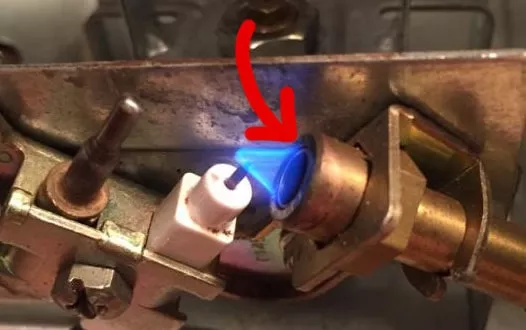 The orifice where the small pilot light comes out needs a yearly cleaning. But that’s about it for propane heater maintenance.
The orifice where the small pilot light comes out needs a yearly cleaning. But that’s about it for propane heater maintenance.
The easiest way to work around this problem is to use a propane hose with a built-in fuel filter with your propane heater. Then, you need to do practically no maintenance.
Propane heaters have no moving parts, and, therefore, don’t wear down over time. They might need an occasional pilot light cleaning if you use a propane hose without a filter.
Diesel Heaters
Diesel heaters, with all of their built-in moving parts, wear down over time. It’s unlikely a diesel heater outlives a propane heater. All the internal friction wears down a diesel heater over time and breaks down its parts.
So, an occasional part replacement, for example, of the glow plug, is not unusual.
And, diesel heaters are prone to soot buildup, primarily in the combustion chamber, exhaust system, and air intake.
So, you will have to clean that regularly. Overall, I’d say, diesel heaters require more cleaning than propane heaters.
Also, Diesel heaters have fuel filters that need to be checked and replaced periodically. A clogged fuel filter can restrict fuel flow, leading to inefficient operation or heater failure. You have to replace the fuel filter according to the manufacturer’s recommendations, usually once a season or after a certain number of operation hours.
Diesel heaters wear down faster and require more cleaning than propane heaters.
3. Fuel Supply
Propane Heaters
There are two ways to get propane. Either you buy propane bottles and small tanks for one-time usage, or you get a large tank, have it refilled and pay by the gallon, which is usually cheaper.
In most places, there is a propane refill station / store within a few minutes’ driving distance.
You can buy propane bottles and pre-filled tanks at any Home Depot. And websites like Propane-Tanks.com help find refill stations across the US and Canada.
Propane is available anywhere within a short driving distance.
Diesel Heaters
Just like propane, diesel is widely available. You can get diesel at any gas station.
That makes diesel heaters incredibly convenient for car / van / truck heating.
With a diesel heater, you can get fuel refills at every gas station. You never need to visit an extra place to refuel diesel.
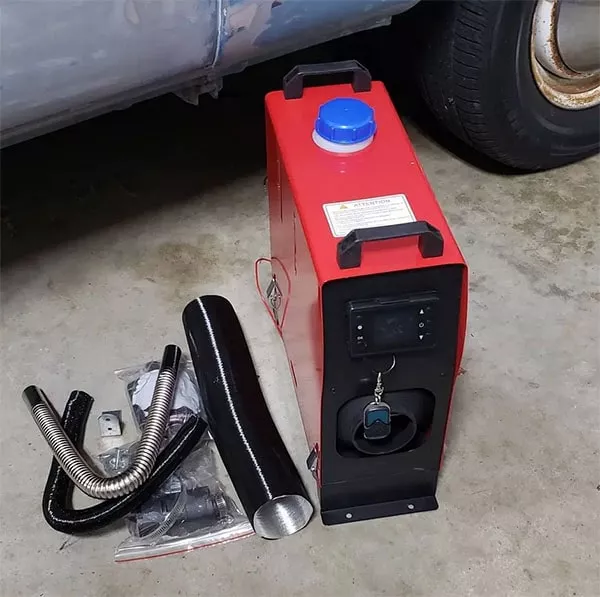 Diesel heaters are ideal for use in vehicles, since you can refill them at any gas station.
Diesel heaters are ideal for use in vehicles, since you can refill them at any gas station.
4. Heat Output
Propane Heaters
Propane heaters are very strong. Depending on their size, they output anything between 9,000 BTU/h and 50,000 BTU/h (for completely off-grid heaters), and beyond 80,000 BTU/h for larger heaters that require some electricity.
Most regular propane heaters that are portable and need no electricity output between 20,000 BTU/h and 30,000 BTU/h. That’s more than enough power to heat even large apartments and practically any garage, tent, or vehicle.
Diesel Heaters
Diesel heaters (for whatever reason) are rated in Kilowatts and usually output either 5kW or 8kW.
That corresponds to a range of roughly 17,000 BTU/h to 27,000 BTU/h.
So, diesel heaters output roughly the same heat as regular propane heaters, they need electricity to work.
But it’s hard to find any models stronger than that. For most vehicles and portable usages, they are more than strong enough. However, if you want to heat larger spaces, such as warehouses or large garages, you should pick a strong propane heater instead.
It’s easy to find a strong propane heater with 80,000 BTU/h to 120,000 BTU/h, but very hard to find a diesel heater with that heat output. I’ve found some torpedo-heater-style diesel heaters that output 30kW (~100,000 BTU/h), but these are only available in Europe, for some reason.
5. Installation
Propane Heaters
Propane heaters are ready to go as soon as you hook them up with a propane tank. Propane heaters require no installation.
Some wall-mounted propane heaters need to be mounted to the wall. And some (large-scale) vented propane heaters need a vent through the wall (but that’s the exception).
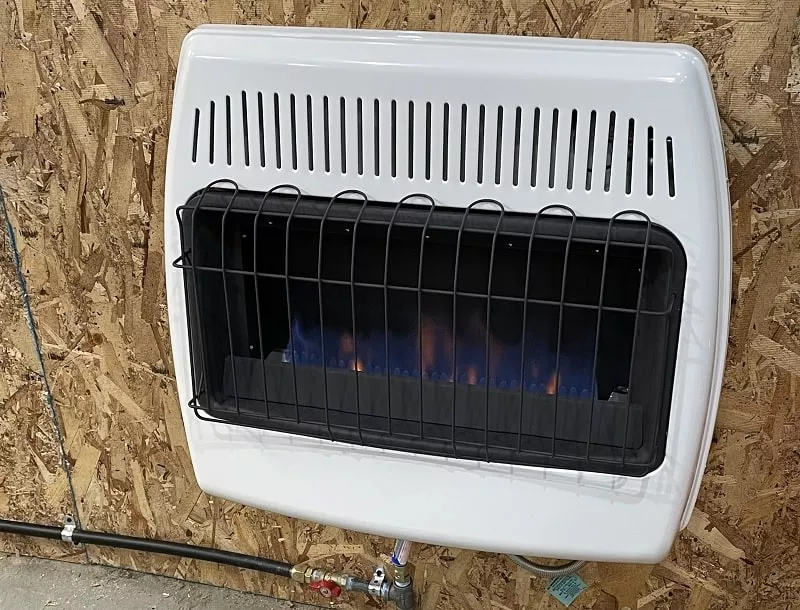 Here’s a fully installed wall-mounted Dyna-Glo propane heater: It’s wall-mounted and it has a simple propane line setup (which you can see below the heater)
Here’s a fully installed wall-mounted Dyna-Glo propane heater: It’s wall-mounted and it has a simple propane line setup (which you can see below the heater)
But, on average, propane heater installation and setup takes just a few minutes.
Place the heater and tank wherever you need them. Connect them with a propane hose. That’s it.
Diesel Heaters
Diesel heaters always require installation, especially when you install them in a van, car, or truck.
First of all, you need to install an additional diesel tank or tap into the main tank (which requires drilling a hole). Then, you need to lay out the fuel line and properly mount the diesel heater under a seat.
Then, you need to setup an electric connection, either directly to your vehicle’s onboard electronics or to a replacement car battery you carry with you.
Overall diesel heaters require more installation, including a tank setup, mounting, and electric wiring.
Diesel or Propane Heater: Which One Should You Pick?
So, which one should you pick: A diesel or a propane heater?
Based on everything we found out so far, it’s pretty simple to make a good choice.
Here’s the answer:
Whenever you want to heat a fixed space (living space, garage, basement), or an off-grid place (cabin, tent, camping van), a propane heater is the best choice.
If you want to heat a car, van, or truck and you don’t mind the installation, but you do mind the refills, get a diesel heater.
Recommended Heaters: Propane and Diesel
It’s relatively easy to find good propane heaters, and relatively hard to find good diesel heaters.
I guess the reason for that is that propane heaters are so simple and are easy to manufacture well. However, diesel heaters contain many components, are harder to produce, and less fault-tolerant.
There are two propane heaters, I want to recommend:
- Mr. Heater Big Buddy: The Mr. Heater Big Buddy is a strong portable propane heater, heats without electricity and is the perfect off-grid and emergency heater. I have a Mr. Heater Buddy myself and love it.
- Dyna-Glo Wall-Mounted Heater: This Dyna-Glo wall-mounted heater is a great propane heater for any fixed setting, e.g. for heating garages, basements, etc., since it doesn’t take up any floor space. And, of course, it doesn’t require any electricity.
Here’s my recommendation for a diesel heater:
- LF Bros Diesel Heater: The LF Bros Diesel heater has a built-in 5L (1.3 gallon) fuel tank, works on 12V / 24V car batteries, and comes with a 110V transformer, so you can even use it on a standard wall outlet! This diesel heater requires practically no setup for indoor usage. But of course, it only works with electricity. Great when you need a heater that works in your truck and your workshop.
Conclusion
Overall, diesel and propane heaters are quite different. But the differences are easy to sum up.
Propane heaters work without electricity and require very little setup (aside from the propane tank). Diesel heaters need electricity to run, and require some setup (especially in a car).
Both output roughly the same amount of heat. Diesel is more abundantly available at any fuel station along the road.
And I’m sure by now you know which heater is the better choice in your case!
Hope you enjoyed this article and found it helpful. Shoot me a mail if you have any questions.
